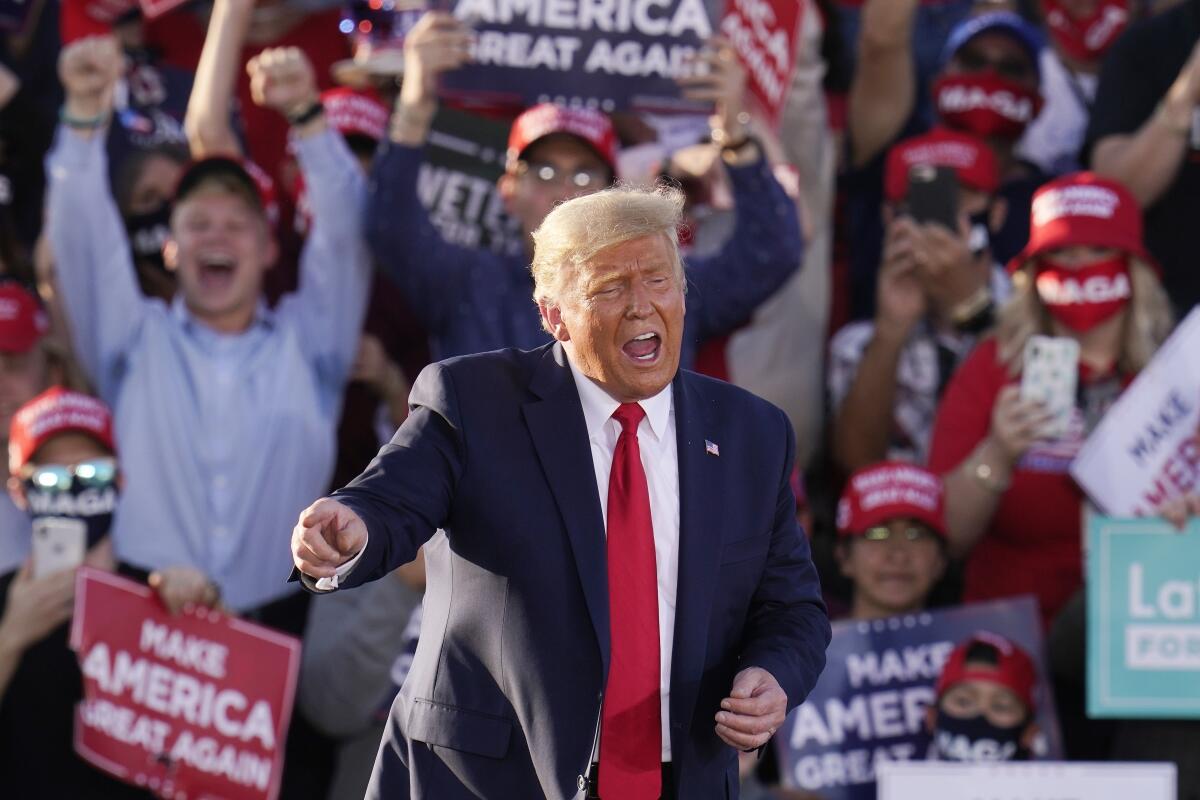Trump, stirring up more chaos in final stretch, may be exhausting the voters he needs

- Share via
KILL DEVIL HILLS, N.C. — In the final throes of an increasingly daunting reelection campaign, President Trump is revving up his rally schedule and whipping his supporters into a frenzy with the type of nonstop outrage that helped make him the most polarizing political figure of his time.
He suggested the governor of Michigan, already the target of an alleged kidnapping plot, should be jailed. He blasted the nation’s top infectious disease expert as “a disaster.” He baselessly called former Vice President Joe Biden a “criminal” and urged his attorney general to investigate him.
And on Tuesday he abruptly ended an interview with CBS’ “60 Minutes,” the most-watched newsmagazine on TV, and then tweeted that it was “FAKE and BIASED” and threatened to post the video himself.
To Trump, turning the volume up to 11 is an instinct, and a near guarantee he will be the center of attention. But to the rest of the country, particularly voters he needs to close a 10-percentage-point polling gap, there is growing evidence of exhaustion that may cost him crucial votes.
“The childish personality lost its humor when — I don’t know — just about a year or two and it like became real and you’re like, ‘Oh, my gosh,’” said Josh Peterson, a 24-year-old surfboard builder from Kitty Hawk, N.C., who didn’t vote in the last election but now plans to vote for Biden in a swing state that could determine the presidency.
His initial amusement over Trump’s election four years ago, he said, disappeared in wave after wave of chaos, controversy and cartoonish behavior. “The humor wore off as it became like more real and like, this is who we are to the outside world.”

Even for those retreating to this sandy escape on the state’s Outer Banks during the pandemic, there is little refuge from the daily assault of headache-inducing political news that has overwhelmed many American homes since 2016.
Judy Jones, a retired social worker from Clayton, N.C., is volunteering for Biden through her local Democratic Party, partly driven by her sense of fatigue with Trump.
“You’d wake up in the morning — ‘What has he done today? You know, are we going to blow up today?’” she said. “We just want to wake up and go. ‘OK, there’s someone decent with integrity running this country.’”
Shirley Bruce, a 64-year-old homemaker from Charlotte, N.C., visibly recoiled when asked about Trump’s public persona. “This whole table is throwing up behind our masks,” she said as she sat with her relatives outside a coffee shop.
According to a Pew Research survey released Monday, overall interest in the election has increased, with 75% of Americans following it “very closely.” But 61% say they’re worn out by all the coverage.
“People are just burned out,” said Cornell Belcher, a Democratic pollster. “They’re tired of being bombarded by politics and they’re tired of always having to talk about it.”
Joe Trippi, a Democratic consultant, began seeing voter exhaustion with Trump in focus groups only a year into his presidency, even in deeply Republican Alabama, when Trippi ran a successful special election campaign for Democratic Sen. Doug Jones.
“Suburban women back then were [saying], ‘How do I turn the chaos off?’” said Trippi, who remains Jones’ consultant in this year’s reelection campaign.
Trippi is dubious Trump can fix that problem at his final debate with Biden, on Thursday night, especially after the president’s over-caffeinated debate performance last month. His constant interjections and verbal assaults disrupted both Biden and the moderator, but polls showed voters didn’t approve.
Hoping to take advantage of the Trump exhaustion factor, a Biden ad from August began by asking simply: “Remember when you didn’t have to think about the president every single day?”
In a year that has seen the country convulsed by a pandemic, recession, racial strife and climate disasters, Biden has presented his candidacy largely as an antidote to Trump’s unending theatrics and partisanship.
He has vowed to pursue consensus and bipartisan solutions, and featured several prominent Republicans at his nominating convention and continues to do so in his fall television ads, including Cindy McCain, the widow of former Arizona Sen. John McCain, the 2008 Republican presidential nominee.
Polls suggest that Trump’s preferred insult for Biden, “Sleepy Joe,” could backfire given many voters’ dismay at the last four years of tumult in the White House.
After Trump and Biden held dueling town halls on separate networks last week, a Trump campaign aide derided Biden’s calming performance by likening it to an episode of “Mister Rogers’ Neighborhood.”
But more viewers watched Biden quietly respond to policy questions on ABC, than tuned in to see Trump and his more hyper, combative performance, even though it aired live on two channels, NBC and MSNBC.
Unlike in 2016, when cable news networks often carried Trump’s rallies live and in their entirety, a move some later defended as market-driven, the president’s rallies this fall are often ignored by the three main TV networks.
Fox News still airs them at times, leaving the more sycophantic and lesser known OAN network along with a handful of YouTube channels as the only regular broadcasters of the president’s near-nightly performances.
Undoubtedly the most camera-conscious president in history, Trump has used every trapping of the presidency, including the Oval Office and Air Force One, as a backdrop to his monologues, constantly churning the news cycle and reacting to television coverage in a self-perpetuating cyclone of both ephemeral and consequential controversy.
“He’s watching his own presidency like a TV show. He’s the No. 1 fan of his presidency, as a fan. He wants to kind of call in or text in for his favorite policy as opposed to kind of leading, governing, doing the heavy-duty research,” said Miranda Banks, an associate professor in the School of Film and Television at Loyola Marymount University.
The question now is whether the Trump show has worn thin. As real crises have engulfed the country, the president, in his continued pursuit of validation from his supporters and irate vocalizations of his own personal grievances, looks more and more like he’s lost the plot.
Trump’s outrageousness “made him a potentially compelling candidate” in 2016, and voters “wouldn’t know exactly what would happen,” as in any good show, Banks said.
“Now we kind of know and we’ve seen the stakes, and the American people are not humored anymore,” she added.

For now, raucous crowds at Trump rallies appear eager to play a familiar role, chanting, “Lock her up!” and “CNN sucks!” They confirm to the president that his performance remains a hit, or as he tweeted Monday about the enthusiasm at his events, “BOFFO.”
“I like him because he’s not a politician. I know he’s a little bit crazy sometimes, the things he says. I like that,” said David Davenport, a 54-year-old owner of a swimming pool business in the coastal town of Southern Shores, N.C.
Likewise, Pam Strickland, a 60-year-old employee of Lowe’s hardware from Kitty Hawk, watches Trump’s rallies “every chance I get.”
“I like his message. I like his style. I like the things he’s accomplished,” she said, not to mention “the comedy of ‘em.”
Stokols reported from Washington and Bierman from Kill Devil Hills.
More to Read
Get the L.A. Times Politics newsletter
Deeply reported insights into legislation, politics and policy from Sacramento, Washington and beyond. In your inbox twice per week.
You may occasionally receive promotional content from the Los Angeles Times.












